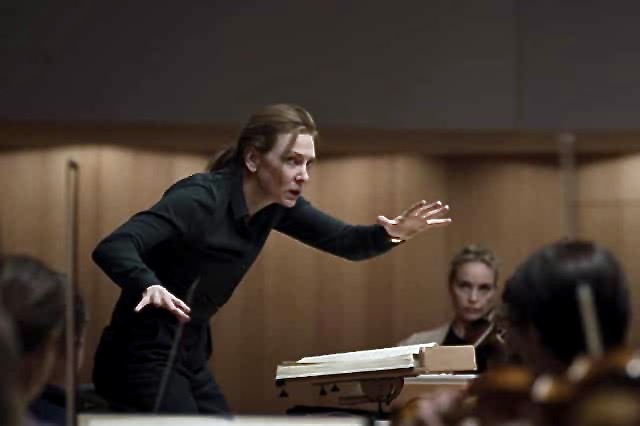Poor Cate Blanchett. She had to endure winning an award.
And now she’s in danger of winning another.
A few weeks ago, she won the Critics’ Choice Award for best actress in a film for her work in “Tar.” During her speech, she said, “I would love it if we would just change this whole f—ing structure. It’s like, what is this patriarchal pyramid where someone stands up here? Why don’t we just say there was a whole raft of female performances that are in concert and in dialogue with one another? And stop the televised horse race of it all?”
You’ve got to feel for her, winning the trophy and all. Still, it’s a tad confusing. If she’s so appalled by the awards, why was she there? Why did she accept the award? And why would awards only affect women?

Cate Blanchett is the best bet to win the best-actress Oscar for “Tar.” Will this upset her? (Focus Features)
Now she’s been nominated for an Oscar for her performance, and my best guess is, despite the horror of it all, she’ll be in attendance to pick up her award if she wins – which most likely she will, unless Michelle Yeoh does for “Everything Everywhere All at Once.” If for no other reason than her Critics’ Choice speech, I hope Blanchett doesn’t win (though I’m not rooting for Yeoh, either).
Look, I’m sick of awards shows, too. But not because of some “patriarchal pyramid” or, God forbid, because competition is involved. I’m sick of them, in part, because of speeches like the one Blanchett delivered. I’m sick of how sanctimonious, pretentious and self-congratulatory so many of them are. The acceptance speeches are often performances in themselves – and not in a good way.
The older I get – and, God knows, I’m a geezer – the more I struggle with this. I used to watch almost all of the televised award shows. I just can’t do it anymore. But I haven’t given up on them completely. I haven’t missed watching the Oscars in more than 50 years (except the one time I was actually on site covering them), and I’m sure I’ll tune in to this year’s ceremony on March 12.
Why? Because (as with so many things) I’m conflicted about the Oscars. They’re like a relative – let’s call him Uncle Oscar – who can be irritating as hell, but you still love him. That said, here are five things I don’t like about the Oscars and five things I do like about them (might as well end on a positive note).
What’s wrong with the Oscars:
1. The emphasis, leading up to the ceremony, on who will win rather than who should win. In other words, the emphasis on predictions. When I worked at the Cape Cod Times, we ran a “Beat the Critic” contest in which readers tried to outguess me by predicting the winners in the top six categories. (My son, when just a tot, was concerned that “Beat the Critic” was meant literally.) The readers seemed to enjoy the contest, and many took part in it year after year and said they looked forward to it. That made me happy, of course. But, as a film critic, I’m much more interested in discussing the quality and meaning of the films I watch; it’s not my goal in life to be a cinematic Nostradamus. I’d rather write about who should win and why rather than who will win and why.
2. The parade of egos (see comments on speeches above). My wife has a funny expression about people who are full of themselves. “Stick a pin in their stomach and they’ll fly around backward,” she says. That’s why she doesn’t watch the Oscars or any award shows.
3. Acceptance speeches that go over the limit. If there’s a time limit for speeches, and nominees are informed of that limit (which they should be, and I assume they are), they should abide by them. It’s selfish to infringe, potentially, on other people’s time by going over. There’s something to be said for a simple “Thank you.”
4. The production numbers. These aren’t the Tonys. Leave the glitz and razzle-dazzle to them.
5. Poor choices for nominees. Of course, this is subjective. But when many of the nominated or even winning films and performances seem subpar, it makes the Oscars less interesting. In the past 10 years, for instance, best-picture wins for “Nomadland,” “The Shape of Water” and “Argo” were letdowns, however expected. Among this year’s 10 best-picture nominees: “Avatar: the Way of the Water,” “The Fabelmans” and “Everything Everywhere All at Once.” Ugh.
What’s right with the Oscars:
1. The suspense. While the many film awards leading up to the Oscars provide a good indication of which nominees will win, there often are at least some surprises. For that reason, there’s some level of suspense as envelopes are opened and winners are about to be announced. And suspense, as any Hitchcock fan knows, can be a lot of fun.
2. The hosts. This isn’t always the case – Remember the James Franco-Anne Hathaway pairing? – but when a host delivers laughs, it can make a huge difference. Billy Crystal (nine times) was a great host. So was Jimmy Kimmel, who will be back for a third time this year.
3. Speeches that are genuinely moving. These can come from presenters or winners. My all-time favorite Oscar moment was when William Holden and Barbara Stanwyck were presenting an award in 1978, and both got choked up as Holden spoke of how Stanwyck saved his career by sticking up for him when they were making 1939’s “The Golden Boy.” Then, when she received a special Oscar in 1982, Stanwyck spoke of Holden, who had recently died, saying, “I loved him very much, and I miss him. He always wished that I would get an Oscar. And so tonight, my golden boy, you got your wish.”
4. The “In Memoriam” segment. The tribute to stars, directors and others who have died in the past year is always moving, and as important as the awards themselves.
5. The celebration of great artistry. Again, this is subjective. Who’s to say what’s great art and what isn’t? (Answer: We are. All of us.) The Academy Awards might have been a marketing tool from the start, and maybe they still are. But they also are an opportunity to recognize (even if “only” with a nomination and not a win) movies and performances that moved or enlightened or entertained us. We can root for our favorite performers or directors or writers or whomever, and take pleasure in seeing them experience the joy of being appreciated.
At their best, the Oscars can still be a rewarding experience for anyone who loves movies and the people who make them.
And that’s why I’ll keep watching.
** Click here for Tim Miller’s previous movie columns for Cape Cod Wave **
Please like Cape Cod Wave on Facebook.
Cape Cod Wave Magazine covers the character & culture of Cape Cod. Please see our Longform stories.
Tim Miller is co-president of the Boston Society of Film Critics. He teaches film and journalism at Cape Cod Community College in West Barnstable. You can contact Tim at [email protected] or follow him onTwitter @TimMillerCritic. Or you can ignore him completely.

































It’s part of her job to be there. She just can’t take her name off the voting list even if she wanted to because that’s such in bad taste just to let another contender win. And if you’ve been following the awards season closely, you’ll see how Cate’s been campaigning for TÁR, Todd Field, and Michelle Yeoh more than she’s been campaigning for herself.
You’re exactly the reason why the televised horserace of it all needs to stop. She’s not saying to stop honoring women. She just said to stop pitting women against each other.
Thanks for your thoughts, Coddler. We clearly have very different views/interpretations of the situation. I appreciate that you took the time to express yours.
Tim